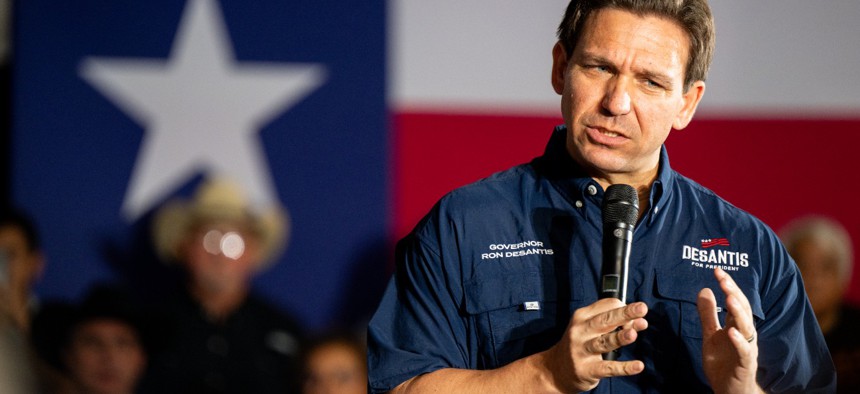
Republican presidential candidate, Florida Gov. Ron DeSantis, speaks during a campaign rally on June 26 in Eagle Pass, Texas. Brandon Bell / Getty Images
DeSantis pledges to eliminate agencies and slash the federal workforce, following a long line of recent GOP candidates
Florida governor and presidential candidate says his administration would "fundamentally reshape Washington."
The federal government should eliminate the departments of Commerce, Education and Energy, as well as the Internal Revenue Service, according to a top contender for the Republican nomination for president in 2024.
Gov. Ron DeSantis, R-Fla., who typically trails only former President Trump in most public polling for the upcoming Republican primaries, told Fox News that his administration would work with Congress to get rid of the agencies he views as unnecessary. DeSantis’ proposals echoed those from many of his recent predecessors seeking to lead the executive branch—including current rival, Trump—though none of those ideas have been brought to fruition.
The Florida governor did not specify how he would manage the dissolution of those agencies, which collectively employ more than 150,000 workers, nor what would happen to key components such as the Commerce’s National Weather Service or Energy’s oversight of the nuclear weapons program. Many Republicans have called for the abolishment of IRS, arguing a simpler tax code would eliminate the need for the agency. DeSantis did not spell out which entity would be responsible for collecting taxes in that system.
As president, Trump repeatedly sought to eliminate 19 mostly small, independent agencies, but Congress ignored those proposals. His administration also spent months seeking to eliminate the Office of Personnel Management, before the president ultimately reversed those plans. Trump is not alone in those failures. Efforts by administrations of both parties to dissolve agencies have been unsuccessful for decades.
DeSantis’ list largely mirrors one put forward in 2015 by Sen. Ted Cruz, R-Texas, who said he would allow his appointed secretaries to come up with a small number of programs worth preserving. Several candidates during that election cycle discussed their plans to eliminate agencies including those on DeSantis' list and the department of Housing and Urban Development, the Transportation Security Administration and even the Veterans Affairs Department.
Then-Gov. Rick Perry, R-Texas, infamously forgot which agencies he wanted to eliminate during a Republican primary debate in 2011. Trump later tapped him to lead the third and final department he neglected to mention on the debate stage—Energy—and Perry publicly renounced his former views.
“I have learned a great deal about the important work being done every day by the outstanding men and women of the DOE,” Perry said during his confirmation hearing in 2017. “My past statements made over five years ago about abolishing the Department of Energy do not reflect my current thinking. In fact, after being briefed on so many of the vital functions of the Department of Energy, I regret recommending its elimination.”
As secretary, Perry became particularly enamored with Energy’s National Laboratories, frequently visiting locations across the country and emphasizing their important contributions to science. Trump’s Education secretary, Betsy DeVos, had the opposite experience, saying last year the agency she led “should not exist.”
Education has been in the crosshairs of numerous politicians since its creation in 1980. President Reagan pledged to eliminate it, as have Republican lawmakers ever since. A previous iteration of the department also served as a rare example of an agency actually being abolished. Congress created an original Education Department in 1867, but eliminated it a year later in the backlash to Reconstruction.
Noting Congress may not go along with his plans, DeSantis said he would enter the White House with a backup plan.
“I'm going to use those agencies to push back against woke ideology and against the leftism that we see creeping into all institutions of American life,” the governor said.
During his interview, DeSantis touted his success in culling the number of state employees in Florida and pledged to bring the same approach to the federal government. He noted his plan to keep the number of state employees per capita flat, meaning when he had to add staff to the state Department of Corrections he found other agencies at which to make cuts. Florida, he said, has one of the lowest per capita rates of public employees. DeSantis expressed an openness to increasing government worker pay when necessary for recruiting, alluding, again, to his efforts at the Department of Corrections. The governor vowed to "re-constitutionalize" the federal government by taking power away from unelected bureaucrats who have presided over an "accumulation of power over decades."
“You know, we talked about draining the swamp in 2016,” DeSantis said, referring to one of Trump’s slogans. “That didn't happen. I think the better analogy is breaking the swamp because you can drain it a little bit [and] the next guy can fill it back in. So we're gonna fundamentally reshape Washington.”
Trump similarly sought to eliminate federal jobs—even issuing a “Comprehensive Plan for Reforming the Federal Government and Reducing the Federal Civilian Workforce”—but the administration eventually walked back the mandate. After his four years in office, Trump oversaw a 2% growth in the civilian federal workforce. Gains at the departments of Defense, Homeland Security and Veterans Affairs, however, more than made up for losses at nearly every other major federal agency. President Biden, meanwhile, has slowly started to rebuild staffing at most agencies.
Trump has once again pledged to, if reelected, purge the civil service of any employees he views as standing in the way of his agenda.







